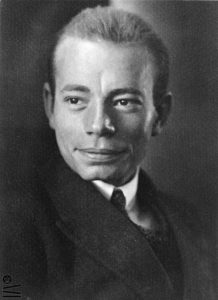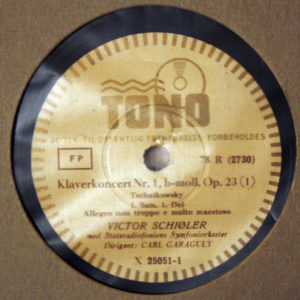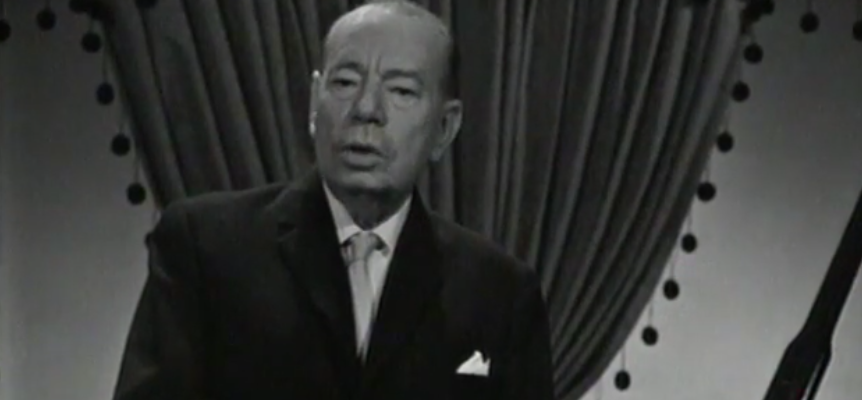It is truly astounding how some of the most amazing pianists are not as well remembered as some of their colleagues. It is a fact that while many great artists had notable careers, others did not pursue aspirations to tour internationally or record extensively. And yet the names of some very popular performers can easily fade from public consciousness after they die, particularly if their recordings become harder to come by (if any were made at all).
Victor Schiøler, a remarkable pianist whose name I first encountered in the last few years thanks to the internet, was a Danish musician who studied with two of the greatest legends of the piano, had a noteworthy career, and made many recordings. However, it was Schiøler’s own pupil Victor Borge who became the ‘great Dane’ of the piano, known the world over for his brilliant musical comedy, although when playing seriously (which he did on rare occasions), Borge was capable of the most exquisite pianism – no doubt due at least in part to the training he received from Schiøler. The comedian’s fame would eclipse his great teacher’s position as Denmark’s pre-eminent pianist, although Schiøler was quite well-known and very respected internationally in his lifetime, and is still remembered in his native land.
 He was born into a musical family on April 7, 1899. His mother Augusta Schiøler was a pianist and her son’s first teacher, and his father was composer and conductor Victor Bendix. After beginning his studies with his mother, the young Victor would train with two of the most revered pianists of the time, among the most admired pupils of the great Leschetizky: Ignaz Friedman and Artur Schnabel. Schiøler’s debut took place in 1914 (he was only 15 years old) and he began touring as a soloist in 1919. He also worked domestically as a conductor, appearing on the podium for the first time in 1923 and being conductor and musical advisor at the Royal Opera in Copenhagen from 1930 to 1932.
He was born into a musical family on April 7, 1899. His mother Augusta Schiøler was a pianist and her son’s first teacher, and his father was composer and conductor Victor Bendix. After beginning his studies with his mother, the young Victor would train with two of the most revered pianists of the time, among the most admired pupils of the great Leschetizky: Ignaz Friedman and Artur Schnabel. Schiøler’s debut took place in 1914 (he was only 15 years old) and he began touring as a soloist in 1919. He also worked domestically as a conductor, appearing on the podium for the first time in 1923 and being conductor and musical advisor at the Royal Opera in Copenhagen from 1930 to 1932.
Schiøler toured internationally to great acclaim—America in 1948-49 and Africa in 1951—but his career was not limited to music. In addition to concertizing and recording, he also received a degree in medicine and practiced psychiatry. He had long been interested in medicine but had delayed studying it in order to follow Schnabel’s advice that he give concerts in Germany. When he stopped playing in that country due to Hitler’s ascent to power in 1933, he began the formal study of medicine. He spent the last two years of the War in Sweden, and would not return to play in Germany after the War, being quite outspoken against those who did not speak up against Nazism.
By his own admission, Schiøler had ‘a tendency to have too many irons in the fire – irons of the most different kinds.’ In addition to his concert and recording career, obtaining his degree in medicine, and professional psychiatric practice, Schiøler worked in other arenas of the musical scene: he was chairman of a committee to help performing artists with matters of contracts, royalties, and copyright, and he was also active with “Musik og Ungdom” or “Music and Youth,” the Danish branch of the organization Jeunesses Musicales. In his later years, he had a TV program in Denmark called From the World of the Piano, and chose to limit his concert activities: as he wanted to spend as much time as possible with his family, he travelled only if his wife and son could accompany him. His son shares that “in the mid 1960s, there was a trend to play super avant garde music in Danish radio and television – even pieces where the artists were required to destroy their instruments etc. My father was very outspoken against this, which for sure did not make him any friends in the radio/TV circles. This is one reason why he was very rarely played on the radio or TV after his death (in contrast to his extremely popular programs in earlier years) and thus also a reason why he was largely forgotten.”
On March 9, 1964 Schiøler celebrated his 50th anniversary on stage with a concert at the Falkoner Centret in Copenhagen. He played the Chopin E Minor Concerto (which he had played at his debut in 1914), Beethoven’s Appassionata Sonata, and then Tchaikovsky’s 1st Concerto, and after a fanfare by the orchestra, encores by Czerny (!) and Scriabin. His son said that the house was a sea of flowers after the event, and it was on this date that he was also awarded the Ingenio et Arti medal, which is presented (at that time by King Frederik IX) to scientists and artists – a significant recognition to his lifetime dedicated to sharing classical music in his native country.
A recording of that event has been shared on YouTube, completely unedited (the full intermission was recorded too!) and is presented in two clips: first the Chopin Concerto and Beethoven Sonata, and in the second clip the Tchaikovsky, fanfare, and encores. The rapturous applause gives a clear indication of what a momentous occasion this was, and the playing is indeed phenomenal: despite a few minor slips, Schiøler plays as he does in the other live and studio recordings that have been made available, with sumptuous singing tone, elegant phrasing, intelligent voicing, and an incredible balance of power and sensitivity.
The first part of the concert:
and the second:
 Victor Schiøler died in 1967, not long before his 68th birthday, leaving behind a significant number of recordings spanning a four-decade period: there is a wonderful discography available online compiled by Nils Ravn and René Aagaard (click here). His first disc dates back to 1924 for the Nordisk Polyphon label – Chopin’s Berceuse and Valse Op.64 No.2 – and in 1925 he made his first record for HMV in England. Over the years he also recorded for Columbia, Sonora, and TONO, with several discs recorded by HMV and many of his performances being issued internationally on Mercury and Capitol.
Victor Schiøler died in 1967, not long before his 68th birthday, leaving behind a significant number of recordings spanning a four-decade period: there is a wonderful discography available online compiled by Nils Ravn and René Aagaard (click here). His first disc dates back to 1924 for the Nordisk Polyphon label – Chopin’s Berceuse and Valse Op.64 No.2 – and in 1925 he made his first record for HMV in England. Over the years he also recorded for Columbia, Sonora, and TONO, with several discs recorded by HMV and many of his performances being issued internationally on Mercury and Capitol.
His 1945 recording of Tchaikovsky’s Piano Concerto No.1 on the TONO label would for a time be the best-selling classical record in Denmark. It was apparently the first Danish recording of a piano concerto, but its popularity was largely due to the opening of the work being used in a Barbett razor blade commercial screened at all Danish cinemas around the time, leading the theme to be locally known as the ‘Barbett Concerto.’ (The first record of the 4-disc set sold about ten times as many copies as the entire set as a result of its use in the commercial.)
 With several hours of recordings on a variety of international labels under his belt, Schiøler ought to be better known today, and yet with the exception of the release of double-disc sets on the Danacord label from his home country (the sixth volume was released in March 2023), he has been largely ignored by the recording industry. All of his performances feature the qualities that are the signs of a truly great pianist: a rich vibrant sonority, a mindfully shaped singing line, attentive balance of harmonic support in lower registers (his chords are also beautifully voiced), rubato coordinated with musical architecture, and refined use of dynamic layering and pedalling. His recordings reveal style and individuality but never at the expense of the music – he seems to have always brought dignified discernment to his interpretations.
With several hours of recordings on a variety of international labels under his belt, Schiøler ought to be better known today, and yet with the exception of the release of double-disc sets on the Danacord label from his home country (the sixth volume was released in March 2023), he has been largely ignored by the recording industry. All of his performances feature the qualities that are the signs of a truly great pianist: a rich vibrant sonority, a mindfully shaped singing line, attentive balance of harmonic support in lower registers (his chords are also beautifully voiced), rubato coordinated with musical architecture, and refined use of dynamic layering and pedalling. His recordings reveal style and individuality but never at the expense of the music – he seems to have always brought dignified discernment to his interpretations.
This 1929 recording of Schiøler playing two Scarlatti Sonatas arranged by Tausig – the once-popular Pastorale and Capriccio – captures the pianist’s beautifully burnished line in the treble register, precise and even articulation, judicious use of the pedal add an extra sheen to tonal colours, and marvellous sense of rhythm.
A fine example of Schiøler’s unerring good taste is this 1942 recording of Chopin’s famous A-Flat Major Polonaise Op.53, a work that is often delivered with bombast and self-centred virtuosity. In his reading, Schiøler does not shy away from power while emphasizing the nobility of conception and beauty of Chopin’s legendary work. What a full-bodied sonority, incisive rhythmic pulse, and transparent textures! Note how the bass sings through with great presence yet without obscuring the content of upper registers… superb!
Schiøler’s 1951 HMV recording of Liszt’s Piano Concerto No.1 (available on the first Danacord retrospective) features the same tasteful but thrilling playing, the Danish pianist’s sumptuous sonority, refined dynamic layers, and elegant phrasing all serving the musical content while still delivering excitement where the score calls for it.
Schiøler’s approach to the classical repertoire is no less mesmerizing, his glorious recording of Beethoven’s Sonata in C Minor Op.111 being a particularly fine example of his refined and noble artistry. His majestic phrasing, varied tonal palette, subtle nuancing, and magnificent voicing are a wonder to behold: particularly appealing is his manner of letting the bass sonority sing loudly without being brash or overpowering, without ever obscuring the melodic content (as is the case in the Chopin Polonaise featured above).
This film footage of Hansen from Danish television is a wonderful opportunity to see the pianist in action. In an episode of his TV program From the World of the Piano, he paid tribute to Schubert by accompanying singer Ib Hansen in a reading of Der Wanderer before giving a brief lecture and launching into his own performance of Schubert’s Wanderer-Fantasie. Both performances reveal the same attention to tonal beauty, clarity of articulation, poised voicing, and fluidity of phrasing that characterize all of his recorded performances, the lied demonstrating wonderful ensemble with the singer.
The second double-disc set from Danacord includes the pianist’s glorious 1956 traversal of Schumann’s Carnaval, a magnificent reading that captures to perfection the composition’s varied moods, with his long singing line, poised voicing, rhythmic bite, and marvellously proportioned rubato.
A third volume was issued in April 2019, featuring four Beethoven Sonatas, the two famous Chopin Sonatas, and some other pieces. Once again, the playing is nothing short of miraculous. Even in works as overplayed as the Pathétique and Appassionata Sonatas, Schiøler plays with an intelligence that shines through in every note, with melodic lines marvellously shaped, transitions seamlessly phrased, and articulation flawlessly coordinated.
The fourth volume of recordings issued in February 2020 includes his recording of Beethoven’s 32 Variations in C Minor. As this is the work that would unexpectedly lead to me learning about historical recordings (a lousy recording I bought led my teacher to show me her 78s, and that was that), I was of course thrilled to hear what he would do with the piece. Like all of the Beethoven recordings I’ve heard by Schiøler, this is absolutely top-notch playing: steady rhythm without being boxy, masterful voicing, wonderful timing, accenting that doesn’t break the line (and what lines he forges!), and absolutely gorgeous tone at all dynamic ranges and note length.
A fifth volume released in May 2020 includes some live recordings (a thrilling and elegant Tchaikovsky 1st Concerto among them) but it is a much shorter work that captured my attention, another from my early years of historical recording exploration: Rachmaninoff’s once-ubiquitous Prelude in C-Sharp Minor. Schiøler plays with elegance, refinement, power, and a cohesive vision. I find this a thoroughly remarkable reading, with a distinct avoidance of bombast or schmalz, with sumptuous singing tone, wonderful subtle timing adjustments to highlight emotion, and in particular an attention to the decay of sound together with skillful use of the pedal so that there is no jarring effect as he transitions between phrases, chords, or sections. How rare to hear this work played this lyrically, but still with power.
The sixth Volume of Schiøler recordings (issued in March 2023) includes live recordings of the 1st and 4th Beethoven Concertos, a jaw-dropping concert recording of the Brahms 2nd Concerto, a few solo studio recordings, plus a two-piano recording with one of his students. As always, the playing is sublime in each performance.
I had come across the March 14, 1952 concert performance of Brahms Concerto (with Carl von Garaguly conducting the Royal Danish Orchestra) a year prior to its release and immediately shared it on YouTube as I was absolutely stunned by the phenomenal majestic sweep and power of the performance – fortunately it is now commercially available on this Danacord set, as it is a reading that I consider to be one of the greatest I’ve heard. The finest qualities of Schiøler’s pianism are all on display here: full-bodied tone at all dynamic levels, elegantly crafted melodic lines, wonderful interplay between primary and secondary voices, impeccably weighted chords, and exquisite transparency of texture.
These are all the more impressive given the degree to which Schiøler plays with impassioned urgency and fiery intensity, without any compromise to tonal colour or refinement of nuance. Particularly worthy of attention are the long sweeping lines that continue with remarkable cohesiveness and momentum, such as in the lyrical passages in the 2nd movement (I don’t think I’ve ever heard the passage from 21:45 to 22:02 played so beautifully) and throughout the 3rd movement.
While it is a shame that Schiøler is not as lionized as many of his contemporaries, we are fortunate that at least some of his recordings are available on CD and via YouTube, and one hopes that a complete reissue of this fine artist’s performances will one day be produced. He is most certainly an artist worth hearing again and again in his many hours of recordings, all demonstrating truly intelligent, insightful, inspired pianism.

Comments: 6
This is marvelous, and very much appreciated!
Some of the greatest await reminders and/or re-discovery.
You have done so much for those of us who ‘live’ in the world of the piano!❤️🎶🎹👏👏👏🎵😇🙏
So glad you enjoyed it. Such an amazing artist – and indeed much more to discover, as there are hours of recordings, many of which have never even been on LP, let alone CD…
Thank you for the kind words about our discography! Your writing is very interesting and your examples are great.
René
Thank you so much for having produced such an important document – it is exemplary! Very much appreciated!
What magnificent playing from Schiøler! It’s astounding that he isn’t better known. What a glorious Carnaval! It’s marvelously sensitive to the line, but never descends into preciousness. This is the playing of a great master.
Glad you like him as much as I do – indeed, his playing has sensitivity without lapsing into sentimentality… always wonderful shaping of the line. He was indeed a master!